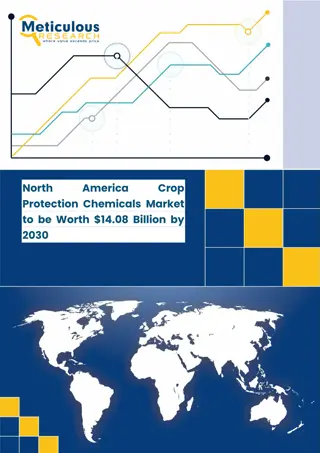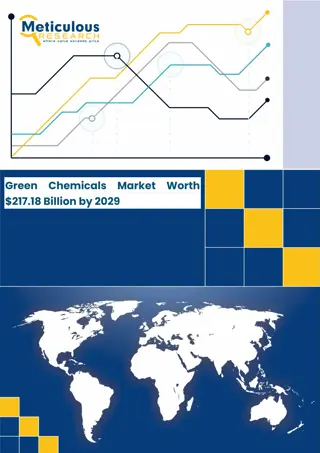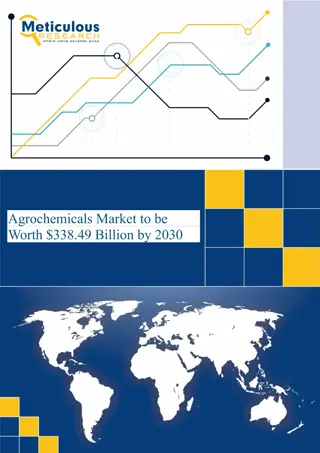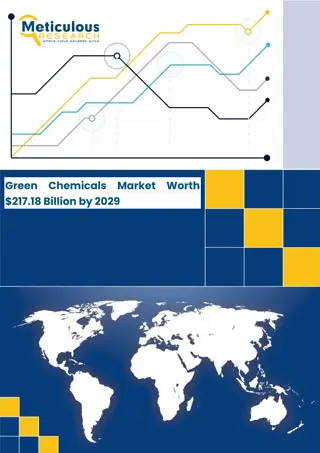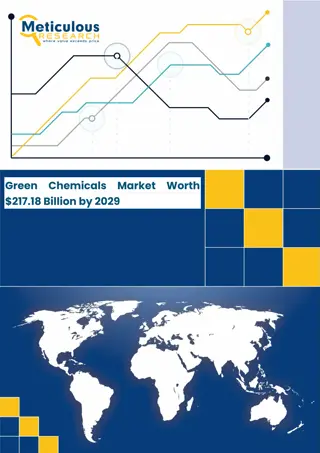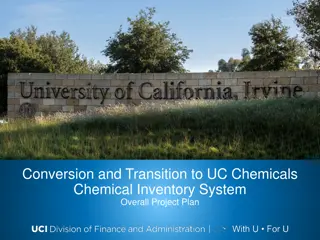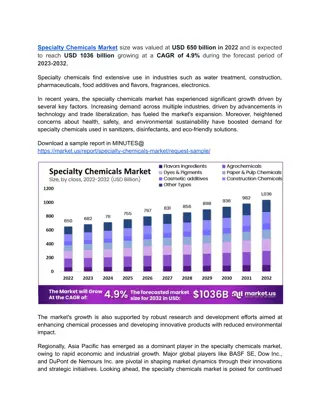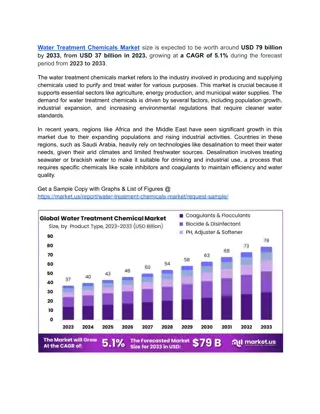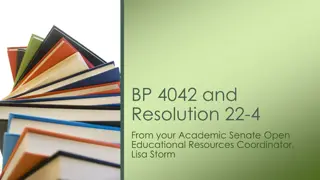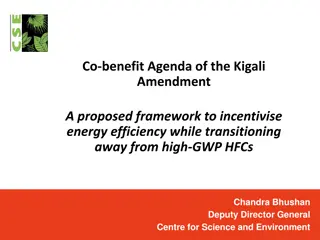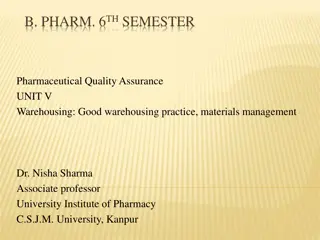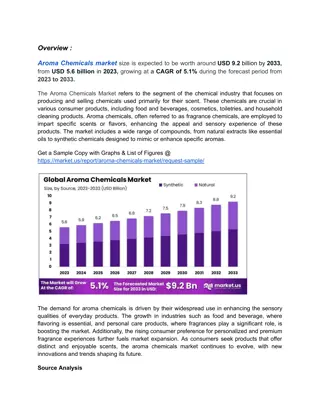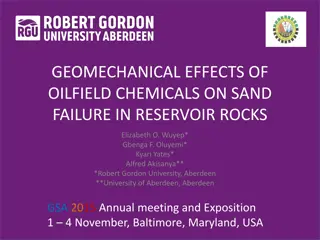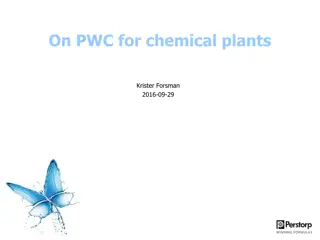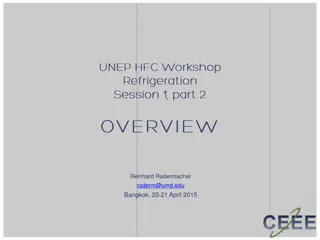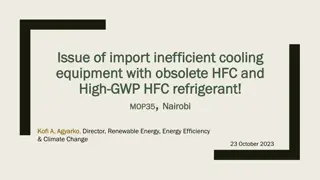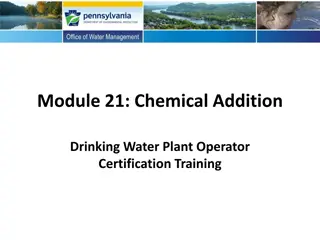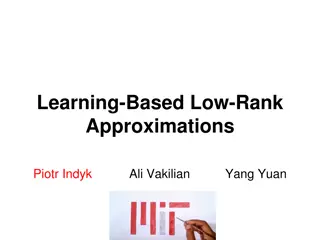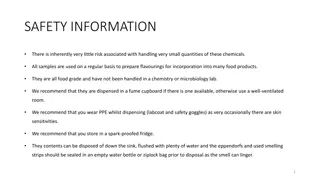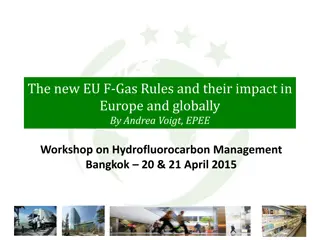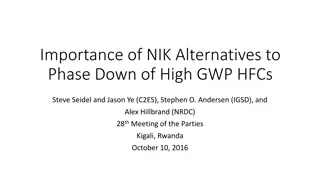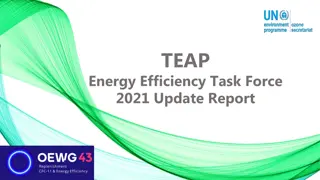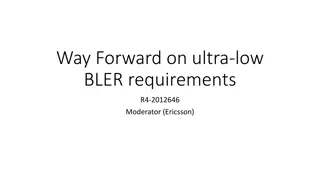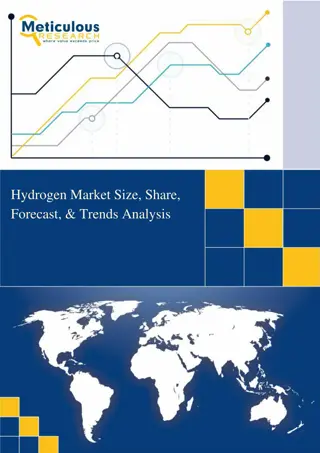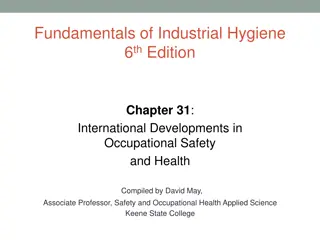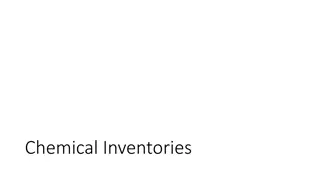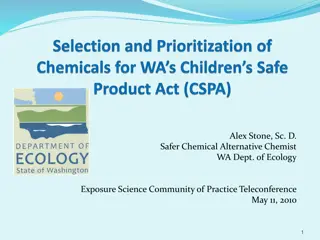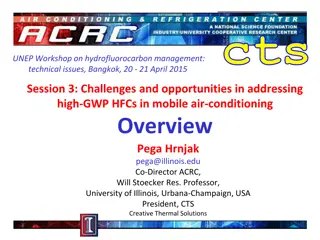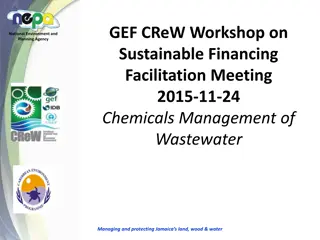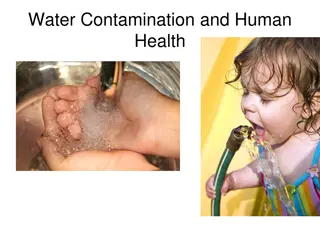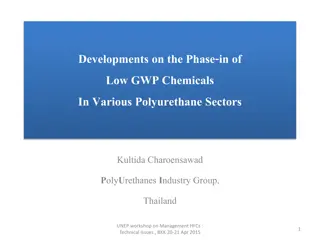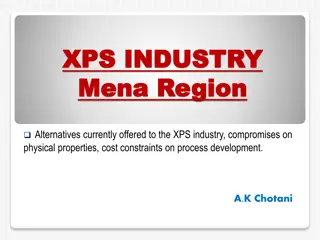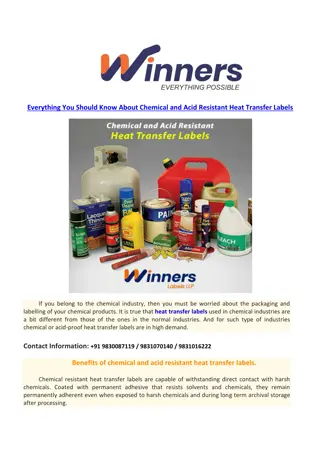Green Chemistry Chemicals Market Size Report, 2022-2029
The green chemicals market is expected to reach $217.18 billion by 2029 at a CAGR of 11.6% from 2022 to 2029. The growth of this market is driven by the scarcity of non-renewable resources, growing awareness regarding sustainable products, rising government initiatives to promote the use of green ch
2 views • 4 slides
Understanding NHANES Data for Environmental Exposure Studies
National Health and Nutrition Examination Survey (NHANES) is a crucial population-based survey in the U.S. that collects data on health and nutritional status. This data supports various applications, including assessing human exposure to environmental chemicals. NHANES conducts biomonitoring to qua
5 views • 27 slides
North America Crop Protection Chemicals Market
North America Crop Protection Chemicals Market by Type (Synthetic [Herbicides, Insecticides], Biological [Bioinsecticides, Bioherbicides]), Formulation (Liquid, Dry), Mode of Application (Seed Treatment, Soil Treatment), Crop Type - Forecast to 2030\n
7 views • 4 slides
Overview of Heavy Chemicals Manufacturing Process
The field of industrial chemistry involves the large-scale preparation of heavy chemicals, which are chemicals produced and used commercially. This process requires an understanding of various physico-chemical principles and specific manufacturing techniques for chemicals like Ammonia, Sulphuric Aci
1 views • 30 slides
Green Chemicals Market Worth $217.18 Billion by 2029
The Green Chemicals Market is expected to reach a value of $217.18 billion by 2029, at a CAGR of 11.6% during the forecast period 2022\u20132029.\n
1 views • 4 slides
Agrochemicals Market to be Worth $338.49 Billion by 2030
Agrochemicals Market by Type (Fertilizers, Synthetic Chemicals, Biological Chemicals, Biostimulants, Plant Growth Regulators), Form (Dry, Liquid), Mode of Application (Seed Treatment, Soil Treatment, Fertigation), Crop Type - Global Forecast to 2030\n
0 views • 4 slides
Green Chemicals Market Worth $217.18 Billion by 2029
The Green Chemicals Market is expected to reach a value of $217.18 billion by 2029, at a CAGR of 11.6% during the forecast period 2022\u20132029.\n
0 views • 4 slides
Green Chemicals Market Worth $217.18 Billion by 2029
The Green Chemicals Market is expected to reach a value of $217.18 billion by 2029, at a CAGR of 11.6% during the forecast period 2022\u20132029.\n
1 views • 4 slides
Streamlining Chemical Inventory Management with UC Chemicals
This project plan focuses on transitioning existing chemical inventories into UC Chemicals system to address challenges with outdated information and database discrepancies. The UC Chemicals application offers real-time updates, assists first responders, and simplifies inventory reconciliation using
0 views • 21 slides
Key Innovations in Specialty Chemicals for the Textile Industry
Specialty Chemicals Market By Class (Flavors Ingredients, Agrochemicals, and Other Types), By End User Industry (Automobile, Agriculture, and Other Industries), By Region and Companies - Industry Segment Outlook, Market Assessment, Competition Scenario, Trends, and Forecast 2023-2032
0 views • 4 slides
Competitiveness in the Water Treatment Chemicals Market
Water Treatment Chemicals Market By Product Type (Coagulants and Flocculants, Biocide and Disinfectant, pH, and Other product types), By End-Use (Power, Oil & Gas, Chemical Manufacturing, and Other End-Uses) and by Region and Companies Industry Segme
0 views • 4 slides
Academic Senate Resolutions and Low-Cost Thresholds in Higher Education
The Academic Senate addresses the adoption of open educational resources (OER) and low-cost materials to support academic freedom and compliance with legislative requirements. The resolution discusses the definition of low-cost resources and the variability among California Community Colleges in set
2 views • 9 slides
Transitioning Towards Energy Efficiency: Co-Benefit Agenda of the Kigali Amendment
The Kigali Amendment proposes a framework to incentivize energy efficiency while phasing out high-GWP HFCs. Reports highlight the urgency to limit global warming to 1.5°C, emphasizing the need for deep emission reductions across all sectors. Investments in low-carbon technologies and energy efficie
0 views • 17 slides
Pharmaceutical Quality Assurance: Unit V - Warehousing Practices by Dr. Nisha Sharma
Explore the importance of good warehousing practices in the pharmaceutical industry as discussed in the 6th-semester course of Pharmaceutical Quality Assurance. Dr. Nisha Sharma elaborates on the concepts of warehousing, GWP, key activities, functions, and elements of good warehousing practices, emp
1 views • 17 slides
Aroma Chemicals Market Expected to Soar with Surge in Organic and Natural Produc
Aroma Chemicals Market; By Source(Synthetic, Natural, Natural-Identical), By Products(Benzenoids, Terpenes and Terpenoids, Musk Chemicals, Others) (Ketones, Esters, Aldehydes), Application, Flavors, Convenience Foods, Confectionery, Dairy Products, B
0 views • 4 slides
Sanjivani Agencies - Supplier of Retail Pharma Chemicals in Hyderabad
Established in 2019, Sanjivani Agencies is a leading supplier and trader of Retail Pharma Chemicals in Hyderabad. They offer a wide range of products including animal feed, laboratory chemicals, glassware, plastic ware, and more. Committed to quality and customer satisfaction, Sanjivani Agencies aim
0 views • 7 slides
Geomechanical Effects of Oilfield Chemicals on Sand Failure in Reservoir Rocks
This study by Elizabeth O. Wuyep et al. explores the geomechanical effects of oilfield chemicals on sand failure in reservoir rocks. It discusses the role of oilfield chemicals, limitations of previous works, experimental flow chart, and static saturation tests. The research emphasizes the need for
0 views • 25 slides
Understanding Low Band Receive Antennas and the Beverage Flex-4X System
Low band receive antennas, including the Beverage Flex-4X system, are crucial for long-distance propagation on bands such as 160, 80, 60, and 40 meters. Operating on low bands presents challenges like large wavelengths, high levels of QRM and QRN, and the need for effective noise reduction strategie
1 views • 24 slides
Insights into Specialty Chemicals Industry: Perstorp Plantwide Control
Explore the intricacies of specialty chemicals plants through the lens of Perstorp's experience, covering topics such as control objectives, degrees of freedom, and characteristics of these complex facilities. Discover the unique challenges and considerations in controlling processes for specialty c
0 views • 38 slides
Comparison of Refrigerant Properties and Emissions in Refrigeration Systems
This content covers information on refrigerant properties for refrigeration equipment, including displacement volume, flammability, and performance metrics like COP and GWP. It also discusses total emissions comparisons based on material manufacturing, energy consumption, and refrigerant loss. Addit
0 views • 4 slides
Environmental Impact of Inefficient Cooling Equipment and Obsolete Refrigerants in Africa
The issue of importing inefficient cooling equipment with obsolete, high-GWP HFC refrigerants poses a significant environmental threat in Africa. Dumping new appliances with outdated refrigerants leads to wasted resources, air pollution, and climate change. This practice hinders Africa's development
0 views • 19 slides
Chemical Addition in Drinking Water Treatment Plant Certification Training
Learn about the essential topics of chemical addition in water treatment, including the types of chemicals used, safety measures, dosage calculations, and feed systems. Explore the importance of coagulating chemicals and their role in promoting particle aggregation for effective water treatment. Dis
0 views • 133 slides
Learning-Based Low-Rank Approximations and Linear Sketches
Exploring learning-based low-rank approximations and linear sketches in matrices, including techniques like dimensionality reduction, regression, and streaming algorithms. Discusses the use of random matrices, sparse matrices, and the concept of low-rank approximation through singular value decompos
0 views • 13 slides
Food Grade Chemical Handling Safety Information
Handling food-grade chemicals for flavor preparation requires minimal risk with proper precautions. The chemicals include 2,3-Pentanedione and Vanillin, commonly used in food products. Safety measures such as using a fume cupboard, wearing PPE, and proper disposal methods are recommended to ensure s
0 views • 7 slides
Impact of EU F-Gas Rules on Refrigerant Management
The new EU F-Gas rules aim to phase down high global warming potential refrigerants in Europe, promoting the use of lower GWP alternatives. Industry welcomes the regulations but calls for a focus on energy efficiency and overcoming barriers to adopting new refrigerants. Assessments highlight the eco
0 views • 9 slides
Importance of NIK Alternatives in Phase Down of HFCs
NIK alternatives play a crucial role in phasing down high GWP HFCs, with a focus on next-generation solutions like HFOs and HFO/HFC blends. These alternatives have zero ODP and low GWP, making them effective replacements for various sectors. Regulations in the EU, US, Japan, and Canada are driving t
0 views • 15 slides
Addressing Energy Efficiency in Cooling Sector: 2021 Report Highlights
The 2021 update report from the TEAP Energy Efficiency Task Force emphasizes the critical nature of the climate emergency and the need to transition to lower GWP refrigerants and higher efficiency cooling systems. The report focuses on initiatives to enhance the efficiency of room ACs and refrigerat
0 views • 44 slides
Way Forward on Ultra-Low BLER Requirements in Wireless Communication
Explore the agreements and discussions around ultra-low BLER (Block Error Rate) requirements for URLLC (Ultra-Reliable Low Latency Communication) in wireless communication systems. Gain insights into the test methodologies, decision co-ordinates, applicability rules, and open issues related to CQI (
0 views • 9 slides
Innovations in Low-GWP Technologies for the Foam Sector
Explore the development of low-GWP technologies and HCFC alternatives for the foam sector, including retrofitting solutions, safety measures, and cost comparisons. Discover the potential of nanopenta technology to streamline equipment integration. Conclude with insights on cost-effective solutions a
0 views • 8 slides
hydrogen market
The chemicals industry is critical to accelerating the shift toward a low-carbon and circular economy; however, it faces the significant challenge of achieving net-zero emissions. The chemicals industry needs solutions such as hydrogen, carbon captur
1 views • 3 slides
Advancing Indian Leadership in Low-GWP Room Air Conditioning
This presentation highlights the rising demand for super-efficient room air conditioning in India driven by economic growth and increasing disposable income. With a significant portion of buildings yet to be constructed by 2030, the room AC market is poised for substantial growth. The imperative of
0 views • 12 slides
Global Harmonized System of Classification and Labeling of Chemicals (GHS) Overview
The Global Harmonized System of Classification and Labeling of Chemicals (GHS) was developed to address the inconsistencies in hazard information for chemicals globally due to significant trade. The history, mandate, and provisions of GHS, along with additional domestic harmonization efforts, are di
0 views • 29 slides
Building a Comprehensive Chemical Inventory System
Conduct a thorough review of all processes to identify and document all chemicals used on-site, create a standardized inventory with relevant information, and use the inventory to prioritize hazardous chemicals for substitution, track usage quantities, and streamline purchasing practices to prevent
0 views • 7 slides
Regulation of Chemicals in Children's Products for Safety
Massive safety concerns arose in 2007 due to high lead levels in toys, leading to legislation like the Children's Safe Product Act in WA. The Act restricted lead, cadmium, and phthalates in children's products, with a focus on Chemicals of High Concern to Children (CHCCs). The implementation involve
0 views • 27 slides
Challenges and Opportunities in Addressing High-GWP HFCs in Mobile Air Conditioning: Insights from UNEP Workshop
The UNEP workshop in Bangkok discussed technical issues related to high-GWP HFC management in mobile air conditioning. Experts highlighted the pressure for GWP reduction in Europe, the historical competition between CO2 and R134a, and advancements in technology over the past decade in refrigerant sy
0 views • 9 slides
Sustainable Management of Wastewater Chemicals in Jamaica
Wastewater management in Jamaica poses risks due to the use of chemicals that can harm public health and the environment. Proper treatment and disposal of wastewater chemicals are crucial to prevent long-term negative impacts. Addressing this issue requires a policy framework for sound chemical mana
0 views • 10 slides
Water Contamination and Human Health: Causes, Types, and Examples
Water contamination poses a significant risk to human health, caused by various pollutants such as microorganisms, chemicals, industrial wastes, and sewage. Common sources include human and animal sewage, industrial emissions, pesticides, and agricultural runoff. Different types of contaminants incl
0 views • 25 slides
Challenges and Solutions in Transitioning to Low GWP Chemicals in Polyurethane Sectors
Beginning in 2015, Thai foam enterprises faced challenges in adopting low GWP chemicals as alternatives to HCFC-141b. Choices included CP and HFC-245fa, each with cost and feasibility considerations. The transition necessitated careful selection of alternative blowing agents based on costs, investme
0 views • 5 slides
Challenges and Innovations in the XPS Industry
The XPS industry faces challenges in physical properties and cost constraints, with various alternatives and current approaches in different regions. Technologies like CO2-based foams are emerging, but face issues like insulation reduction and density penalties. Compromises on physical properties ar
0 views • 11 slides
Everything You Should Know About Chemical and Acid Resistant Heat Transfer Labels
Chemical resistant heat transfer labels are capable of withstanding direct contact with harsh chemicals. Coated with permanent adhesive that resists solvents and chemicals, they remain permanently adherent even when exposed to harsh chemicals and dur
0 views • 6 slides


